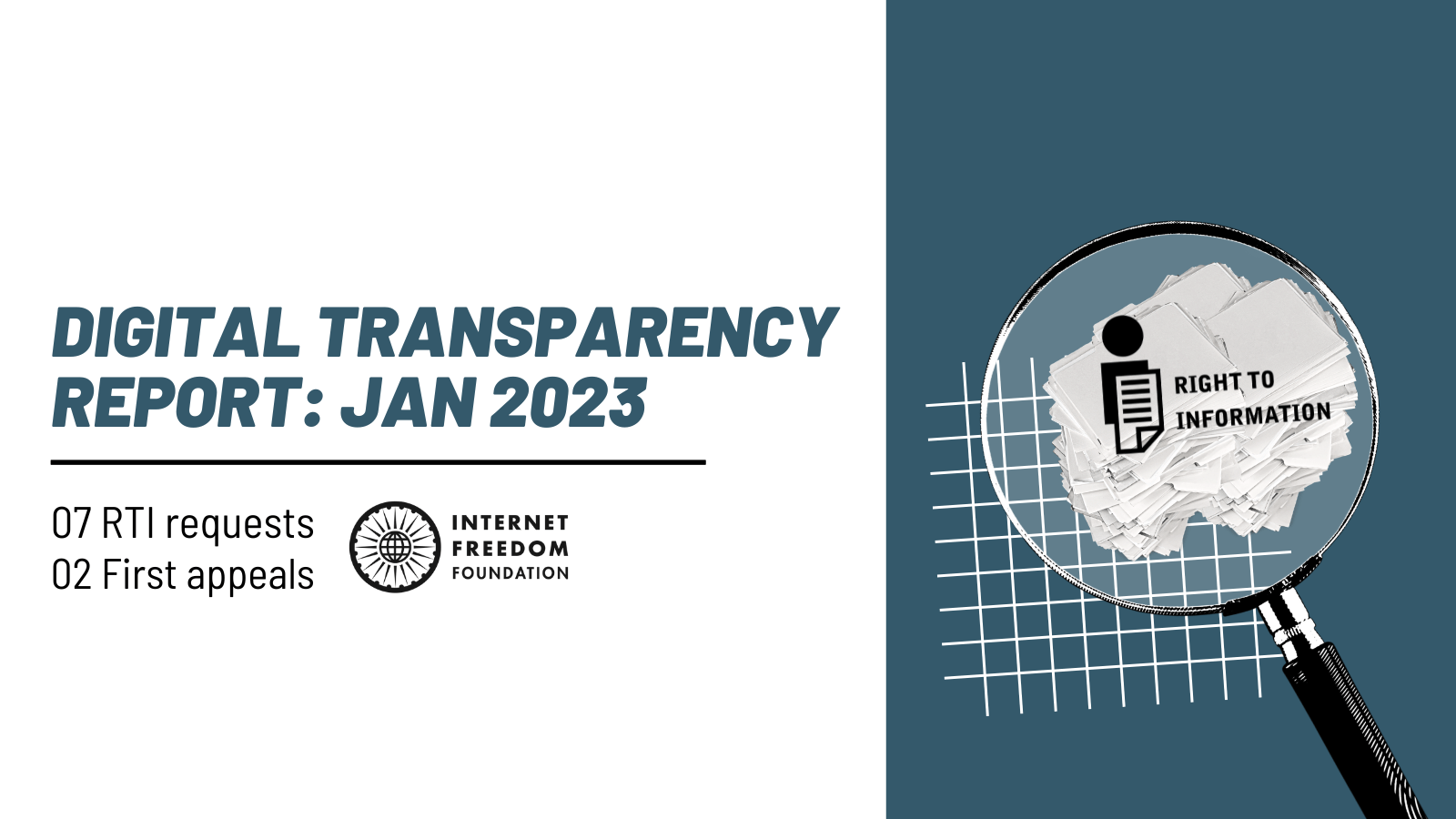
tl;dr
For the month of January 2022, IFF has filed 7 Right to Information (“RTI”) applications and 02 First Appeals. We received 5 responses including 1 from the Ministry of Agriculture & Farmers’ Welfare and 4 from the Department of Electronics and Information Technology.
Why should you care?
The RTI Act was enacted to promote transparency and accountability in the working of every public authority by ensuring that citizens have access to information under the control of public authorities. Facilitating such access is necessary to ensure that democratic processes are not subverted by public authorities acting under private interests. Where transparency is not upheld as a value of public decision-making, citizens are at a disadvantage when it comes to keeping a check on abuse of power by the public authorities.
As we have discovered previously through responses received on our Right to Information applications, several times various government processes and programs continue with little or no transparency. This happens despite the mandate in the RTI Act, 2005 to publish and disclose information to citizens proactively.
The RTI Act is thus one of the most important tools at the disposal of the public to engage with, and demand transparency and accountability from, the Government. We use the Act to extract information about various ongoing policies and projects that the Government launches.
Data Protection and Privacy
One of our key areas of work is ensuring that public authorities respect data privacy and engage in practices that will protect the right to privacy.
Under IFF’s Project Panoptic, we routinely file RTI applications with various public authorities after we come across news reports that they are developing or using facial recognition technology (FRT).
On January 31, 2023, we filed 01 RTI application with the Airports Authority of India seeking information about the DigiYatra Scheme of the Ministry of Civil Aviation.
For more information on the use of facial recognition technology and how it increases mass surveillance, visit IFF’s Project Panoptic.
We also filed RTI applications with:
- Central Railways and Ministry of Railways regarding CCTVs in railways being installed by the Ministry of Railways.
- Kolkata Police regarding installation of CCTV cameras in the city.
- Department of Electronics and Information Technology regarding draft Digital Personal Data Protection Bill, 2022.
- Ministry of Agriculture, Cooperation & Farmers Welfare regarding the MoU signed between the Ministry of Agriculture and Farmers welfare and Wadhwani AI to scale the pest management solution for cotton farmers.
- Department of Electronics and Information Technology regarding inputs purportedly received from various Ministries/Departments and other stakeholders by the Ministry of Electronics and Information Technology (MEITY) in preparation of the draft amendments to the IT (Intermediary Guidelines and Digital Media Ethics Code) Rules, 2021 in relation to online gaming (Draft Amendments).
Apart from this, we also filed First Appeals with:
- Department of Telecommunication regarding Telecom Bill in reference to the RTI application that we had filed on 21.11.2022 pertaining to the public consultations held by the Department of Telecommunications on the draft Indian Telecommunication Bill, 2022, held in November 2022. Aggrieved and not satisfied by the incomplete response of the CPIO, we filed the first appeal on 21.01.2023.
- Department of Electronics and Information Technology in reference to the RTI application that we had filed on 23.11.2022 seeking consultation responses from the Data Governance Division, Ministry of Electronics and Information and Technology (MeitY) regarding the draft Digital Personal Data Protection Bill, 2022. In response, the CPIO stated that they had no record or information relating to the Bill other than a copy of the bill and an explanatory note, both of which are already in the public domain. Aggrieved and not satisfied by the response, we filed the first appeal on 31.01.2023 requesting an adequate, complete and a detailed response instead of a single vague and blanket statement. The response of the First Appellate Authority is awaited.
Free Speech and Censorship
Another focus of our work is to ensure that freedom of speech and expression on the internet is protected and that unnecessary censorship does not lead to a chilling effect on people’s fundamental rights. For this, we routinely file RTI applications to demand accountability for instances that may hamper free speech on the internet, such as website blocking or internet shutdowns.
In January, 2023, we filed 01 RTI application with the Department of Home, Jammu & Kashmir regarding the internet shutdown orders issued by the Home Department.
Help us help you
In case you want us to file an RTI application on an issue which includes any active or proposed program, scheme or initiative of the government impacting the digital rights of citizens, you can fill out this blocksurvey form and we shall then file an RTI application with the concerned authorities. Alternatively, you can also write to us [email protected].
Important Documents
- Digital Transparency: A Right to Information Report for November 2022 dated December 5, 2022. (link)
- Digital Transparency: A Right to Information Report for October 2022 dated November 18, 2022. (link)
- Digital Transparency: A Right to Information Report for September 2022 dated August 14, 2022. (link)
The post was drafted by Bhavya Singh, Litigation Intern, IFF, and reviewed by IFF staffer Anushka Jain.

